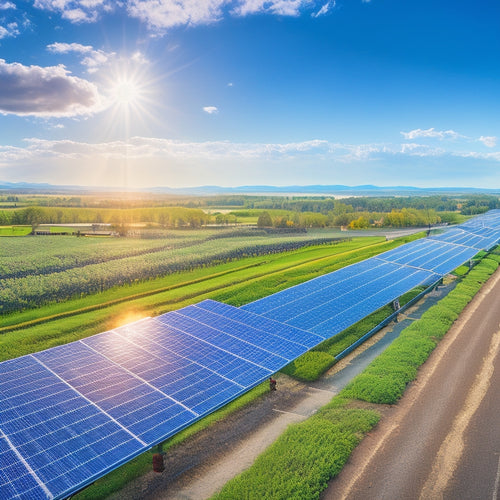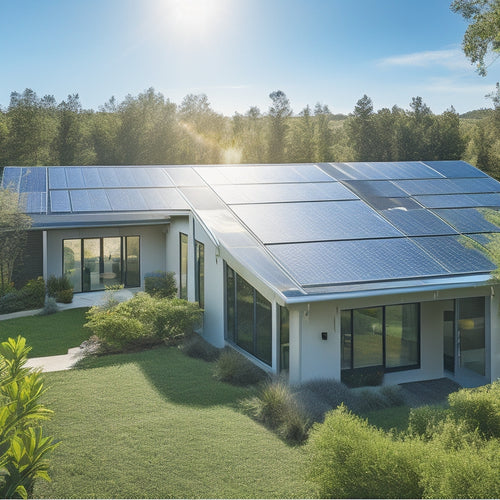
Residential Solar Energy
Share
By investing in residential solar energy, you can greatly reduce your energy expenses, achieve energy independence, and enhance your property's value. You'll enjoy substantial savings by lowering your reliance on traditional energy sources, and with solar financing options available, the initial installation costs become more accessible. High-efficiency solar panels with energy conversion efficiency ratings above 20% can increase your energy output. Consider your roof size, orientation, and obstructions to optimize panel placement for maximum energy production. As you investigate the benefits of residential solar energy, you'll uncover even more ways to save and thrive in a sustainable, energy-independent future.
The Essentials
- Investing in residential solar energy leads to significant savings on energy bills and potential utility credits, achieving energy independence.
- Solar panels increase property value by up to $15,000, making homes more attractive to eco-conscious buyers and amplifying selling price.
- High-efficiency solar panels with ratings above 20% enhance energy output, resulting in lower electricity bills and a reduced carbon footprint.
- Roof size, orientation, and obstructions impact solar panel installation capacity, with south-facing roofs receiving optimal sunlight for energy generation.
- Federal tax credits of 26% of the total system cost help offset upfront installation expenses, making residential solar energy more accessible to homeowners.
Zero Energy Bills Ahead
You're on the cusp of achieving a significant milestone in your residential solar energy path: saving money now and eliminating utility bills.
By investing in a solar panel system, you'll sharply reduce your energy expenses, potentially even earning credits from your utility company.
With a rooftop solar panel system, you'll elevate your home's energy efficiency and increase your home's value and appeal.
As you approach energy independence, you can look forward to zero energy bills ahead.
Save Money Now
Freedom from escalating energy costs is within reach, and it begins with utilizing the power of residential solar energy to greatly reduce your utility bills. By installing a solar panel system, you can markedly lower your reliance on traditional energy sources, resulting in substantial savings on your energy expenses.
Additionally, embracing renewable energy solutions like solar power and battery storage can enable homeowners to break free from reliance on the grid and reduce their carbon footprint, allowing them to reap considerable cost savings while taking control of their energy needs.
With various solar financing options available, the initial installation costs can be mitigated, making it more accessible to homeowners. For instance, you can opt for a solar loan, which allows you to pay for the system over time, or investigate power purchase agreements, where a third-party provider installs and maintains the system in exchange for a fixed monthly rate.
Eliminate Utility Bills
Achieving a zero-energy bill status is now a realistic goal for homeowners who invest in residential solar energy systems. You can break free from the shackles of monthly utility bills and enjoy the freedom that comes with generating your own clean energy.
By utilizing the power of the sun, you can greatly reduce your reliance on the grid and eventually eliminate your energy bills altogether. With extensive packages like Renewable Energy Bundles, you can secure a reliable and renewable source of energy, reduce your energy bills, and stay connected during power outages.
To guarantee maximum energy production and minimal maintenance costs, it's crucial to follow solar maintenance tips, such as regular cleaning and inspection of your solar panels. Additionally, investing in energy storage solutions like batteries can help you store excess energy generated during the day for use during the night or on cloudy days.
This allows you to optimize your energy usage and minimize your dependence on the grid. By combining these strategies, you can enjoy a life of energy independence and say goodbye to those pesky utility bills for good.
Increases Property Value Fast
You'll find that installing residential solar energy systems enhances your property's selling price and adds long-term value.
With the average cost of single solar panels for homes being more affordable than ever, solar panel cost is no longer a major barrier to entry.
In fact, studies have shown that solar-powered homes sell for considerably more than their non-solar counterparts.
Boosts Selling Price
Installing a residential solar energy system not only reduces your carbon footprint but also greatly amplifies your property's selling price. As the solar market trends continue to grow, residential installation is becoming an attractive feature for homebuyers. In fact, a study by the National Renewable Energy Laboratory found that solar panels can increase your property worth by up to $15,000.
| Location | Average Increase in Property Worth | Source |
|---|---|---|
| California | $5,900 | National Renewable Energy Laboratory |
| New York | $13,000 | Appraisal Institute |
| Colorado | $10,100 | Colorado Energy Office |
| Texas | $6,300 | Texas A&M University |
| Florida | $8,500 | University of Florida |
As you can see, the enhancement in selling price varies by location, but the trend is clear: solar energy systems are a significant asset to any property. By installing a residential solar energy system, you're not only reducing your carbon footprint but also increasing your property's worth and appeal to potential buyers. This can be a major selling point, especially in areas with high demand for eco-friendly homes.
Adds Long-Term Value
As residential solar energy systems become a sought-after feature in the real estate market, their ability to add long-term value to your property becomes increasingly important. This is particularly significant in today's solar market trends, where environmentally conscious homeowners are willing to pay a premium for properties with sustainable energy solutions.
By installing a solar energy system, you're not only reducing your carbon footprint but also increasing your property's appeal to potential buyers.
The environmental benefits of solar energy are undeniable, and they directly translate to long-term value for your property. A study by the National Renewable Energy Laboratory found that solar panels add an average of $15,000 to a home's value.
This increase in value can be attributed to the reduced energy costs and the appeal of a sustainable lifestyle. As you consider investing in a residential solar energy system, remember that you're not only saving money on energy bills, but you're also making a smart investment in your property's future.
High-Efficiency Solar Panels
You'll want to contemplate high-efficiency solar panels, which boast higher panel efficiency ratings, typically above 20%.
These ratings directly impact the energy output, resulting in an enhancement to your overall energy production.
For instance, top-rated high-efficiency residential solar panels best solar panels for residential can considerably increase your energy yield.
Panel Efficiency Ratings
When sizing up high-efficiency solar panels, panel efficiency ratings take center stage. You want to know how well a solar panel can convert sunlight into usable energy. This is where energy conversion efficiency comes in – it's the percentage of sunlight that's converted into electrical energy. High-efficiency solar panels boast higher energy conversion efficiency ratings, resulting in more power per hour of sunlight.
Here's a breakdown of some high-efficiency solar panels and their corresponding efficiency ratings:
| Solar Panel Model | Efficiency Rating (%) |
|---|---|
| Panasonic HIT-240 | 21.8 |
| SunPower X-Series | 22.8 |
| LG NeON 2 | 20.5 |
| Trina Solar TALLMAX | 20.2 |
When selecting a high-efficiency solar panel, consider the energy conversion efficiency rating alongside other factors like cost, durability, and warranty. By choosing a panel with a high efficiency rating, you can maximize your energy output and enjoy greater freedom from the grid.
Energy Output Boost
High-efficiency solar panels pack a punch when it comes to energy output, and their enhanced performance is a direct result of their superior energy conversion efficiency ratings. You'll experience a significant enhancement in energy production with these advanced panels, which translates to more power for your home and a lower electricity bill.
By utilizing more energy from the sun, you'll reduce your reliance on the grid and enjoy greater energy independence.
High-efficiency solar panels are made possible by advancements in solar panel technology, which have led to improved photovoltaic cells and more efficient energy conversion. This means you can generate more power per hour of sunlight, even in areas with limited sunlight.
To maximize your energy output, you can pair your high-efficiency solar panels with advanced energy monitoring systems. These systems track your energy production in real-time, providing useful knowledge to optimize your energy usage and identify opportunities for further improvement.
With high-efficiency solar panels and energy monitoring systems, you'll be well on your way to achieving energy freedom and reducing your carbon footprint.
Consider Your Roof Size
When evaluating your roof's suitability for solar panels, you need to take into account the available space and its impact on the system's overall performance.
You'll want to assess how much roof space is available for panel installation, considering obstructions like skylights, vents, and chimneys.
Additionally, it's vital to contemplate the energy efficiency solutions that can be integrated with your solar power system, such as renewable energy systems, to maximize your energy savings.
Ideal panel placement is also significant, as it affects energy production and system efficiency.
Roof Space Availability
Your roof's size plays a critical role in determining how much solar energy you can generate. The amount of available roof space will impact the number of solar panels you can install, and subsequently, the amount of electricity you can produce.
When evaluating your roof's space availability, consider its orientation. A south-facing roof receives the most sunlight throughout the day, making it ideal for solar panels. East- and west-facing roofs are also suitable, but north-facing roofs may not be the best option.
Shading factors also come into play when reviewing your roof's space availability. Trees, chimneys, vents, and other obstructions can cast shadows on your roof, reducing the area available for solar panels.
You'll need to evaluate the extent of shading on your roof and adjust your solar panel installation accordingly. By considering your roof's size, orientation, and shading factors, you can determine the best solar panel configuration for your home, giving you the freedom to generate clean, renewable energy and reduce your reliance on the grid.
Optimal Panel Placement
Suboptimal Panel Placement (Consider Your Roof Size)
A rectangular roof space, unobstructed by skylights or vents, provides an ideal canvas for solar panel installation. When considering your roof size, you'll want to assess the available space to determine the best panel placement. This involves evaluating the roof's dimensions, orientation, and potential shading issues.
| Roof Orientation | Shading Analysis | Ideal Panel Placement |
|---|---|---|
| South-facing | Minimal shading | Centered, horizontal rows |
| East-/West-facing | Moderate shading | Staggered, vertical columns |
| North-facing | Significant shading | Avoid or consider alternative solutions |
You'll want to conduct a shading analysis to identify areas with minimal obstructions, ensuring maximum energy production. The orientation impact of your roof will also influence panel placement. For example, a south-facing roof with minimal shading is ideal for centered, horizontal rows. Conversely, an east-/west-facing roof with moderate shading may require staggered, vertical columns. By considering these factors, you can enhance your solar panel placement for maximum energy freedom.
Government Incentives Boost Savings
You can greatly reduce the cost of your solar panel system with federal tax credits.
Currently, you're eligible for a tax credit of 26% of the total cost of your system, which can add up to thousands of dollars in savings.
Federal Tax Credits
Through the Federal Solar Investment Tax Credit (ITC), homeowners can greatly reduce their federal income tax liability. You're eligible for this tax credit if you own your solar panel system and have taxable income.
The ITC allows you to claim a credit of 26% of the total cost of your solar panel system, including installation and equipment. This credit can be claimed on your federal income tax return, reducing your tax liability and increasing your savings.
As a homeowner, you can benefit from the renewable energy benefits offered by the ITC. By investing in solar energy, you're not only reducing your carbon footprint but also increasing your energy independence.
The ITC is a significant incentive that can help offset the upfront cost of solar panel installation, making it more accessible and affordable for you. By taking advantage of this tax credit, you can enjoy substantial savings and reap the benefits of renewable energy.
Frequently Asked Questions
Can I Install Solar Panels on a Metal Roof?
You can install solar panels on a metal roof, but you'll face unique installation challenges compared to traditional roof types, requiring specialized brackets and careful planning to guarantee a secure and watertight seal.
Are Solar Panels Affected by Shade From Trees?
Like a dark cloud blocking sunlight, shade from trees can considerably impact your solar panel performance. You'll need to assess the shade impact and consider tree management strategies, like pruning or removal, to optimize energy production and guarantee your freedom from grid dependence.
Do Solar Panels Produce Electricity During a Blackout?
During a blackout, you won't get electricity directly from solar panels, but if you have a battery storage system, you can maintain grid independence, and your stored energy will power your home, giving you freedom from the grid's outages.
Can I Sell Excess Energy Back to the Grid?
A million opportunities await! Yes, you can sell excess energy back to the grid through net metering benefits, earning energy credits that offset your consumption, and even generating revenue, giving you ultimate freedom from utility bills!
How Often Should I Clean My Solar Panels?
You should clean your solar panels every 6-12 months, depending on pollution levels, to maintain ideal energy output. Use soft brushes and gentle cleaning techniques to avoid scratching the panels, ensuring effective solar panel maintenance and maximum energy freedom.
Final Thoughts
With residential solar energy, you're on track to slash your energy bills to zero. Take the example of the Smiths, who installed a 5-kilowatt system on their California home. They now enjoy a 90% reduction in their energy costs, saving around $1,500 annually. By utilizing government incentives and high-efficiency solar panels, you can enhance your property value and start reaping the benefits of clean, renewable energy. It's time to tap into the power of the sun and start saving – your wallet and the environment will thank you.
Related Posts
-

Renewable Energy Solutions to Reduce Your Carbon Footprint
To reduce your carbon footprint, adopting renewable energy solutions is key. Using solar panels or wind turbines can ...
-

Applications of Photovoltaic Systems
Photovoltaic systems are versatile, converting sunlight into electricity for various applications. You can use them i...
-

Installing Metal Solar Roofs for Maximum Energy Efficiency
Installing metal solar roofs can drastically enhance your home's energy efficiency and durability. These roofs withst...


